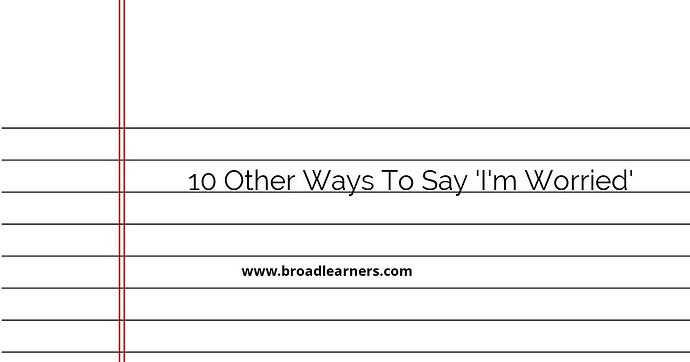Feeling worried is a common emotion that everyone experiences at some point. However, using the same phrase 'I'm worried' repeatedly can become tiresome. If you want to express your concern in a more varied and articulate way, here are 10 alternative ways to say 'I'm worried':
- I'm concerned
- I'm anxious
- I'm uneasy
- I'm apprehensive
- I'm troubled
- I'm nervous
- I'm on edge
- I'm stressed out
- I'm feeling uneasy
- I'm feeling unsettled
Now, let's explore each alternative with examples:
1. I'm Concerned
Saying 'I'm concerned' is a more formal way of expressing worry. It implies a deeper level of worry or unease, often associated with serious situations. For example:
I'm concerned about the recent decline in sales. We need to find a solution to turn things around.
2. I'm Anxious
'I'm anxious' indicates a state of uneasiness or nervousness. It suggests that you are worried about a specific event or outcome. Here's an example:
I'm anxious about the upcoming job interview. I really hope it goes well.
3. I'm Uneasy
Saying 'I'm uneasy' implies a sense of discomfort or restlessness. It suggests a feeling of unease without specifying the exact cause. For instance:
I'm feeling uneasy about the decision the team made. I think we should reconsider.
4. I'm Apprehensive
'I'm apprehensive' implies a feeling of fear or anxiety about something that is yet to happen. It suggests a sense of anticipation combined with worry. Here's an example:
I'm apprehensive about the outcome of the project. There are still many uncertainties.
5. I'm Troubled
Saying 'I'm troubled' suggests a deeper level of worry or concern. It indicates that the situation is causing you distress or disturbance. For example:
I'm troubled by the recent news about the company's financial situation. It's quite alarming.
6. I'm Nervous
'I'm nervous' indicates a state of anxiety or tension, often associated with a specific event or situation. It suggests a feeling of butterflies in the stomach. Here's an example:
I'm nervous about giving the presentation tomorrow. I hope I don't forget what to say.
7. I'm on Edge
Saying 'I'm on edge' suggests a heightened sense of worry or tension. It implies that you are feeling extremely anxious or agitated. For instance:
I'm on edge about the upcoming exam. I've been studying, but I still feel unprepared.
8. I'm Stressed Out
'I'm stressed out' indicates a high level of stress and worry. It suggests that you are feeling overwhelmed by various factors. Here's an example:
I'm so stressed out about the deadline. There's still so much work to be done.
9. I'm Feeling Uneasy
Saying 'I'm feeling uneasy' implies a sense of discomfort or unease without specifying the exact cause. It suggests a general feeling of worry. For example:
I'm feeling uneasy about the current political situation. There's a lot of uncertainty.
10. I'm Feeling Unsettled
'I'm feeling unsettled' suggests a state of restlessness or unease. It implies that something is causing you to feel uncertain or off balance. Here's an example:
I'm feeling unsettled about the sudden change in our team structure. I'm not sure how it will affect our work.
By using these alternative phrases, you can add variety and depth to your expression of worry. Remember to choose the phrase that best conveys your specific feelings and context.
Did I miss anything? Respond below
